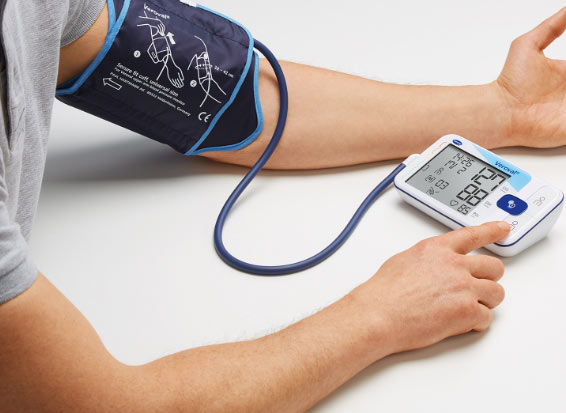Why You Need a Reliable Blood Pressure Monitor at Home
Dry, chapped lips can occur at any time of the year, whether due to harsh winter winds or hot summer sun. Lip balms are the go-to solution to protect, hydrate, and restore moisture to your lips. But with so many options available, how do you choose the best one for your needs?

Benefits of Having a Reliable Blood Pressure Monitor at Home
- Early Detection of Hypertension: Regular monitoring helps identify rising blood pressure levels before they become dangerous.
- Convenience: No need to schedule frequent doctor visits; you can track your numbers at your own pace.
- Data for Doctors: You can provide your doctor with consistent and accurate readings from home, helping them make better treatment decisions.
- Cost Savings: Frequent monitoring at home reduces the need for additional appointments and tests.
- Peace of Mind: Knowing your blood pressure levels helps you feel more in control of your health.
Why Accuracy Matters
A reliable blood pressure monitor ensures you get consistent and accurate readings. Inaccurate readings can lead to inappropriate medication adjustments or missed early signs of hypertension. Choosing a monitor that is well-calibrated and easy to use can make a significant difference in health outcomes.
Common Features to Look for in a Blood Pressure Monitor
- Ease of Use: Look for models with simple, intuitive displays and one-touch operation.
- Accuracy: Ensure the device is clinically validated.
- Memory Storage: Some monitors store multiple readings for one or more users.
- Cuff Fit: A proper fit is crucial for accuracy, so choose a monitor with adjustable cuffs.
- Portability: If you travel, a compact and portable design can be helpful.
- Connectivity: Some models offer Bluetooth connectivity for easy data sharing with health apps.
Top 10 Blood Pressure Monitors in the US (2024)
| Brand/Model | Type | Price Range | Key Features |
|---|---|---|---|
| Omron Platinum BP5450 | Upper Arm, Automatic | $75 – $100 | High accuracy, Bluetooth, multi-user memory |
| Withings BPM Connect | Upper Arm, Bluetooth | $90 – $120 | Compact, Bluetooth sync with app, rechargeable battery |
| QardioArm Smart BP Monitor | Upper Arm, Wireless | $85 – $120 | Portable, app connectivity, sleek design |
| Omron Evolv BP7000 | Upper Arm, Wireless | $100 – $130 | Wireless, portable, all-in-one cuff |
| A&D Medical UA-767F | Upper Arm, Automatic | $60 – $90 | Multi-user memory, budget-friendly |
| Beurer BM55 | Upper Arm, Automatic | $60 – $85 | Adjustable cuff, Bluetooth connectivity |
| iHealth Track Connected BP Monitor | Upper Arm, Bluetooth | $50 – $80 | Simple interface, app integration |
| Omron 10 Series BP7450 | Upper Arm, Bluetooth | $90 – $120 | Dual settings, advanced averaging technology |
| Greater Goods Smart BP Monitor | Upper Arm, Bluetooth | $50 – $75 | Affordable, app connectivity, high accuracy |
| Care Touch Platinum Series | Upper Arm, Automatic | $45 – $70 | Simple operation, large display, memory storage |
Questions and Answers (Q&A)
- Q: How often should I measure my blood pressure at home?
A: It’s recommended to measure your blood pressure at least once or twice a day, depending on your doctor’s advice. Early morning and before bed are common times to take readings. - Q: Can a home blood pressure monitor replace doctor visits?
A: While home monitoring is valuable, it should not replace regular doctor visits. It complements professional care by providing continuous data, but professional evaluations are still essential. - Q: What if my home readings are different from the doctor’s office?
A: Variations can occur due to different conditions (e.g., stress or “white coat syndrome”). To ensure consistency, measure at the same time each day in a calm setting.
Real-Life Example
John, a 58-year-old retiree, discovered he had high blood pressure during a routine check-up. His doctor advised him to monitor his blood pressure at home. After researching, John bought the Omron Platinum BP5450, a highly recommended device known for its accuracy. By tracking his blood pressure daily, John noticed patterns in his readings and could provide his doctor with comprehensive data. As a result, his doctor adjusted his medication, helping him stabilize his blood pressure and avoid further complications.
Blood Pressure Monitor Costs
The price of blood pressure monitors can vary significantly depending on features such as Bluetooth connectivity, memory storage, and advanced data analysis. Here is a general breakdown of what you can expect:
| Type | Price Range | Features |
|---|---|---|
| Basic Upper Arm Monitors | $40 – $60 | Simple interface, fewer features, but accurate readings |
| Bluetooth-Enabled Monitors | $60 – $120 | Sync with apps, track history, multi-user memory |
| Smart Monitors with Apps | $90 – $150 | Wireless connectivity, advanced analytics, sleek design |
| Portable Monitors | $70 – $130 | Lightweight, compact, ideal for travel |
Conclusion
Having a reliable blood pressure monitor at home is a proactive step toward managing your health. With the ability to track your blood pressure regularly, you can stay informed, provide your doctor with accurate data, and make informed decisions about your health. The convenience, accuracy, and peace of mind offered by these devices make them a worthwhile investment for anyone concerned about heart health.
Sources:
This article explores the importance of owning a reliable blood pressure monitor, including features to consider, real-life examples, and a list of top-rated devices available in the US.







Recent Comments